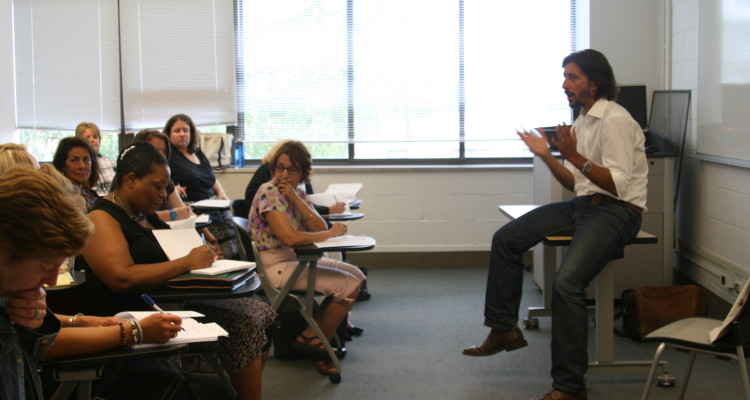Photo by Leigh Tauss: Eric Komoroff addresses attendees in his workshop “Empowering Youth Through Awakening the Song Within Them.”
Seventy-five educators from Bridgeport’s Bassick High School met on Fairfield University’s campus for a professional development day of workshops in preparation for the upcoming semester.
The professional development day was funded by the National Writing Project through the Supporting Effective Educator Development (SEED) grant. The National Writing Project has a network of more than 70,000 teachers nationwide, including 360 teachers in Connecticut. More than 365 teachers have attended summer institutes for writing at Fairfield University. In addition, hundreds of teachers have attended similar programs at UConn-Storrs and Central Connecticut State University, said Dr. Bryan Ripley Crandall, who is director of the Connecticut Writing Project.
While Bassick is less than four miles away from the university, the two institutions might as well be worlds apart. With just a 53 percent graduation rate, according to Public School Review, Bassick has one of the lowest in Connecticut, where on average 88 percent of high school students reach graduation.
Crandall, who also teaches graduate classes and English classes at Fairfield, has been working with children in urban areas for nearly 20 years.
“Urban schools are really faltering right now because of the tremendous obstacles that come with poverty,” said Crandall.
US News lists Bassick as having 99 percent of students who are “economically disadvantaged.” The census reported that 22 percent of Bridgeport’s population lives below the poverty level, compared to the state’s 10 percent.
Crandall and Bassick High School Principal Dr. Wayne Alexander worked together to create the event and give teachers a choice of workshops they could attend on Aug. 26. Options included ways to integrate new technologies into the classroom and to work closely with students.

Teachers listen to Dr. Walter Alexander and Dr. Bryan Ripley Crandall’s presentation.
One workshop was called “Empowering Youth Through Awakening the Song Within Them,” led by Community of Unity founder, Eric Komoroff. Community of Unity is a nonprofit organization based in New York City dedicated to helping youth in underprivileged areas succeed
Bassick High School English teacher Walter Brackett attended Komoroff’s session. “It dealt with something that educators and reformers and administrators don’t often talk about, which is the ‘why’ of students being in school,” he said.
According to Brackett, one of the biggest challenges in connecting with students is “students’ perceptions of themselves.”
He said, “You are talking about students who are not respected by society. They don’t respect themselves, they don’t see a future for themselves – many of them, not all of them- but to a large extent students in an urban setting in a high poverty school like mine they just feel like their lives don’t count. Like they don’t matter somehow.
“Before you can do anything with a kid, you have to get them to see that the work they are doing is important to someone and that’s the key thing,” he said.
For Komoroff, and his workshop, this meant finding the individual “song” within each student, or what makes him or her special.
Alexander said, “There is an interconnectedness to our learning that has always been there. Our kids don’t see that. This year our focus is really going to be seeing that connectedness to the learning process to support what kids need to know.”
The workshops stressed the importance of healthy teacher-student relationships. “Aside from being incredibly heroic,” said Komoroff, “teachers hold the potential in their hand to do real transformative work.”
“If we invest in teachers, we will invest in the students and the future of tomorrow,” said Crandall.
One of the hindrances to empowering teachers is the top-down structure of the education system as it stands today. Standardized testing monitored on the federal level has turned education into a game of numbers, Crandall said.
“Standardized testing has gone beyond control. Right now we are in a culture where testing trumps students and student individuality,” Crandall said. “It’s ridiculous and it needs to end.”
The problem extends well beyond Bassick High.
Speaking from his own experience with teaching Fairfield undergraduates, Crandall said, “The kids I get here in the freshman year, they tend to be smart but they don’t tend to have any creativity. They don’t ask questions. They play it safe because our school system has not taught them to be lifelong learners. We’ve taught them to be test-takers.”
“We are setting [students] up for failure because we’re making it seem like that is what learning is – learning equals test taking.”
Combating standardized testing means bringing more alternative learning methods into the classroom. For English teacher Rose Marie Coy-Blakley, music has proved an essential tool in connecting with students.
“It helps to relax them,” she said. “It brings out their own creativity, but you can also use it as an educational tool. I use it a lot for themes. Connecting the themes from various songs” with content from the curriculum. “And we have great discussions.”
Spanish teacher Asia Forman seemed excited to begin her first year at Bassick, her main takeaway from the professional development day being that the students “want to be there, they want to learn and they need the structure of the school because it’s one of the safest places for them.”
Jan Blevins, an English teacher at Bassick for more than 20 years, commented on what made the professional development day stand out. “Everything has been meaningful. This place, the hospitality, the recognition … has been outstanding and very touching because usually it’s not like that, it’s a little bit different. This has been amazing.”


Leave a Reply